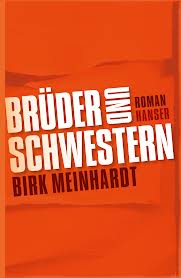The popular sensations of recent literary scene in Germany have been family sagas from the former East Germany (DDR). First there was Uwe Tellkamp's elegiac Der Turm ("The Tower"), then in 2011 Eugen Ruge's In Zeiten des abnehmenden Lichts (In Times of Fading LIght – see my review) caused a stir and won many awards. Now former sportswriter for the Sueddeutsche Zeitung Birk Meinhardt has published a 700-page family drama Brüder und Schwestern ("Brothers and Sisters") which follows the Werchow family from 1973 to 1989 – the final collapse of the DDR, although there is very little in the novel about Die Wende or the tumultuous demonstrations that preceded it.
While Ruge's novel portrayed the party elite who watched helplessly as their world of privilege vanishes, Meinhardt gives us a picture of life for the "little people", the average citizens who try to make a decent life for their families and for themselves in a morally bankrupt system. Most of the novel takes place in Gerberstedt, a fictitious town in the Thuringian province, far from the seat of power in East Berlin. Willy, the patriarch of the Werchow family, is a proletarian everyman who, through ambition, competence – and, of course, party loyalty – becomes the manager of 1,000 employee printing press operation. For years Willy has been able to earn the respect of his workers while kowtowing to the bosses in East Berlin. Finally, however, his professional and personal compromises catch up with him. Willy's wife, Ruth, is an extremely fragile woman, traumatized still by her rape by Russian soldiers during the war. When she learns about Willy's illegitimate daughter, the product of a long-time affair, she has a nervous breakdown and commits suicide.
The reader never gets a glimpse of the illegitimate daughter. However, we come to know quite well the two sons and daughter Willy had with Ruth. The daughter, Britta, is a free spirit who is kicked out of school for putting a Wolf Biermann poem on the schoolyard wall. The youngest son Matti is a brooding idealist who is highly critical of his father for all the compromises he has made with the system. Both Matti and Britta pursue a kind of "interior emigration" to find some space for personal growth and happiness in the DDR. Britta runs off to the circus and achieves success with a sensational erotic dance performance; Matti turns his back on the university and becomes a river-barge pilot, spending his days navigating the interior waterways of East Germany and at night working on a novel. Only the older son, Eric, follows a conventional path; he becomes a marketing agent for East German industry and is allowed to travel – but only in the Soviet Bloc. Like his father, Eric is forced to compromise his integrity to gain even this low level of success: at one point, he is forced by the party to denounce his sister (on the other hand, Eric refuses to work for "die Firma" – the Stasi).
The middle section of Brüder und Schwestern is disrupted by the inclusion of long chapters of Matti's novel – Das verschlossene Kind ("The Locked-Up Child") – an allegorical work written in the style of Hermann Hesse (with grotesque sections reminiscent of Kafka's In der Strafkolonie). The novel-within-a-novel technique is difficult to pull off, and here it seems merely intrusive; it does nothing to advance the core narrative.
Brüder und Schwestern is very entertaining to read, but it does meander over 700 pages. A better novel might have been Vater und Sohn, focusing on the relationship between Matti and Willy, which is the key dynamic of Brüder und Schwestern. Still there are many terrific sections to the novel: the chapter on Erik's brutal treatment in the National People's Army (NVA) is gripping, and the erotic encounter of Matti with his beautiful German teacher Karin Werth is very satisfying. Meinhardt tries to fit too much in here as he struggles for narrative coherence. Brüder und Schwestern ends with the words wird fortgesetzt ("to be continued") which means that Meinhardt intends to follow the Werchow children into the post-Wende era. I am looking forward to reading the next installment, but hope that the author learned something from Brüder und Schwestern.


